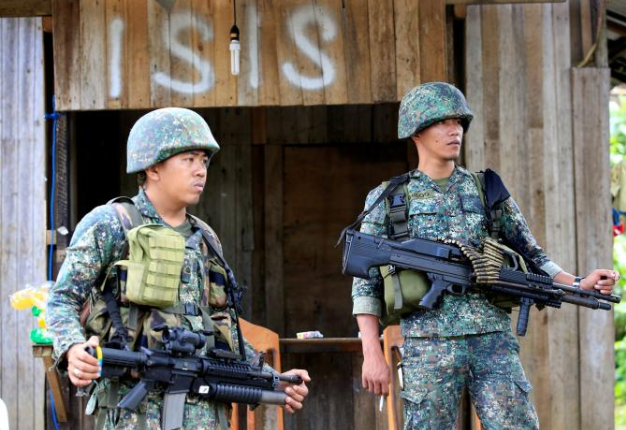
MANILA, Philippines – The Armed Forces of the Philippines (AFP) begged for patience from the people in finishing off the Maute terrorist group in Marawi City, reiterating that the military was not facing an ordinary enemy.
“How long? We can’t say. Konting patience lang po (Some patience please). It would be over,” AFP chief of staff Eduardo Año said at the briefing for the proposed 2018 budget of the Department of National Defense at the House of Representatives.
Asked by ACT Teachers partylist Rep. France Castro on the whereabouts of Abu Sayyaf leader Isnilon Hapilon, Año said, “Based on our monitoring, he’s still in Marawi City. Based on our information, he’s still alive.”
The fighting in Marawi City still rages, close to three months since the Maute group, which is seeking affiliation with the international Islamic State terrorist organization, violently repulsed a law enforcement mission to arrest Hapilon, which prompted President Rodrigo Duterte to declare martial law in the entire Mindanao on May 23.
From the initial prescribed 60-day cap, Congress extended martial law until December 31, 2017.
Of the estimated 600 Maute members that infiltrated Marawi, Año said over 500 have been killed, but he pointed out that the battle was not easy.
“Madaling magsabi na madali (Easy to say it’s like a walk in the park), but the enemy does not play by the rules, they used humans as shields,” he said.
“If there are no hostages … it’s very easy to finish this fight,” he added.
Año said government troops are being “careful and deliberate” in its movement “to prevent loss of innocent lives.”
Earlier, Defense Secretary Delfin Lorenzana reported that the battle has cost the government between P2.5 billion and P3 billion.
On questioning by Castro, Año said every bomb dropped on enemy positions costs P323,000. However, he did not respond when asked about the number of bombs the military has used, so far, in its air strikes, saying divulging the information has security implications.
For 2018, the DND has proposed P144.67 billion in new appropriations.









